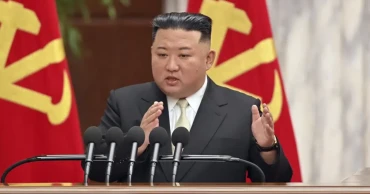food insecurity
N. Korea wants more control over farming amid food shortage
North Korean leader Kim Jong Un vowed to strengthen state control over agriculture and make all available efforts to increase grain production, state media reported, as the country faces a worsening food shortage.
The prospect for an early resolution of its food insecurity is still dim, as North Korea restricts the operation of markets and devotes much of its scarce resources to its nuclear program. While experts believe the food situation is the worst it has been under Kim’s rule, they still say they see no signs of imminent famine or mass deaths.
During a recent four-day ruling Workers’ Party meeting, Kim said his government sees agricultural development as a matter of “strategic” importance and that farming goals should be settled without fail, according to the official Korean Central News Agency.
“In order to attain the gigantic long-term objective of rural development, it is necessary to decisively strengthen the party guidance over the agricultural sector and improve the rural party work,” Kim was quoted as saying.
He said that all state sectors and units must provide “mental and moral, material and technical support and assistance to the rural communities,” saying that should be “a trend of the whole society.”
Kim also ordered officials to overcome unspecified “lopsidedness in the guidance on farming” and concentrate on increasing farm yields. He said provincial, city and county authorities must boost their guidance on agriculture.
KCNA didn’t elaborate how Kim wants to reinforce and improve his government’s control over agriculture.
But experts have said North Korean authorities’ attempts to supply grain via state-run facilities and restrict private dealings at markets was considered one of the reasons behind the worsened food situation. Others include decreased personal incomes, pandemic-related border curbs that blocked unofficial rice purchases from China and the overall economic difficulties deepened by mismanagement, COVID-19 and international sanctions.
North Korea’s grain production last year was estimated at 4.5 million tons, a 3.8% drop from a year earlier, according to South Korean assessments. In the previous decade, its annual production was an estimated 4.4 million to 4.8 million tons. South Korea’s spy agency has said North Korea needs 5.5 million tons of grain to feed its 25 million people each year.
“It is difficult to be optimistic about the food supply as long as Pyongyang insists on implementing North Korean style socialism and isolating the country from international trade and assistance while developing nuclear missiles,” Leif-Eric Easley, a professor at Ewha University in Seoul, said.
Holding a ruling party’s Central Committee meeting focused on agriculture — while previous plenary meetings mostly concentrated on the country’s nuclear program or rivalries with the United States and South Korea — could be an acknowledgement the food situation is serious. But some experts say the country also likely aims to burnish Kim’s image as a leader caring for his people and boost domestic support of his push to expand his nuclear arsenal.
Kim also called for faster construction of new irrigation systems that would help the country cope with extreme weather conditions brought by climate change. He also called for machinery manufacturers to build and supply more efficient farming machines and for workers to accelerate their efforts to reclaim tidelines to expand farming.
According to KCNA, Kim praised the plenary meeting for producing more definite proposals that would put agriculture on a “stable and sustained development track” and accelerate overall prosperity. But the account did not give further specifics.
3 years ago
IFC pledges $6 billion to tackle food insecurity
The World Bank’s private sector arm International Financial Corporation (IFC) has launched a fresh $6 billion financing facility to strengthen the private sector's ability to respond to food insecurity crisis and help support production in countries affected by food instability, a statement said Tuesday.
A core part of the financing, which will be provided through the new Global Food Security Platform, will support sustainable production and delivery of food stocks, it said.
The $6 billion will be used to support private sector companies along the food value chain by leveraging IFC's sectoral expertise in agribusiness, manufacturing, infrastructure, and technology, as well as the financial sector and trade finance.
Read IFC-led PaCT helped factories cut carbon and water footprints: BGMEA
"By strengthening supply chains and ensuring that people have access to and can grow affordable food, this initiative will contribute to building resilient food systems in the most vulnerable regions," said Makhtar Diop, IFC’s Managing Director.
The war in Ukraine and an uneven global recovery from the COVID-19 pandemic have added to rising levels of hunger and malnourishment, which already have been worsened by climate change and increasingly severe weather events that are damaging harvests and reducing yields.
The Platform will supplement the World Bank's commitment of US$30 billion in response to the food crisis as IFC is also stepping up engagements with other partners, including development finance institutions, foundations, banks as well as a range of private companies.
Read Patenga Container Terminal: PPPA signs transaction advisory services agreement with IFC
The $6 billion support will be aimed at facilitating trade of food commodities, delivery of inputs to farmers, supporting efficient production in major origins, including Ukraine, and effective distribution of food products in destination countries, according to the statement.The money will also help improve the resilience of the global food system and lessen its climate and ecological footprint.
This includes investing in increasing efficient crop production, improving access to fertilizers, greening fertilizer production and use, reducing crop loss and food waste, improving supply chain efficiency, and mitigating infrastructure bottlenecks.
IFC, a member of the World Bank Group, is the largest global development institution focused on the private sector in emerging markets including Bangladesh. In fiscal year 2022, IFC committed a record $32.8 billion to private companies and financial institutions in developing countries.
Read Implement Teesta management and restoration master plan: IFC
3 years ago
Over 100 million now forcibly displaced: UNHCR
Worldwide food insecurity, climate crisis, the war in Ukraine and other emergencies from Africa to Afghanistan, forced around 100 million people to flee their homes, the UN refugee agency, UNHCR, said Thursday.
Today, one in every 78 people on earth is displaced; it is a "dramatic milestone" that few would have expected a decade ago, the agency added.
By the end of 2021, the number displaced by war, violence, persecution and human rights abuses stood at 89.3 million, according to the UNHCR's annual Global Trends report.
That was up eight percent from 2020 and "well over double the figure of 10 years ago," the report's authors said, attributing last year's increase to numerous escalating conflicts "and new ones that flared."
"Every year of the last decade, the numbers climbed," said UNHCR chief Filippo Grandi. "Either the international community comes together to take action to address this human tragedy, resolve conflicts and find lasting solutions, or this terrible trend will continue."
The 100 million displaced figure was reached in May, 10 weeks after the Russian invasion of Ukraine prompted a global cereal and fertiliser shortage from these major exporters.
In all, 23 countries with a combined population of 850 million faced "medium or high-intensity conflicts," the UN agency said, citing World Bank data.
Among the 89.3 million globally displaced last year, 27.1 million were refugees – 21.3 million under the UNHCR's mandate, and 5.8 million Palestinians under the care of the UN Relief and Works Agency, UNRWA.
Another 53.2 million were internally displaced people, 4.6 million asylum seekers, and 4.4 million Venezuelans left with little option but to flee their country's economic and political crisis.
Data from the UNHCR report underscored the crucial role played by the world's developing nations in sheltering displaced people, with low and middle-income nations hosting more than four in five of the world's refugees.
With 3.8 million refugees within its borders, Türkiye hosts the largest number of refugees, followed by Colombia, with 1.8 million (including Venezuelan nationals), Uganda and Pakistan (1.5 million each) and Germany (1.3 million).
Also read: Nearly 37 million children displaced worldwide: UNICEF
3 years ago
Covid led to food insecurity in Cox's Bazar: WFP
Almost half of the urban population in Cox’s Bazar Sadar are struggling to have access to food during this Covid-19 pandemic due to significant downturns in livelihoods and income, according to a WFP assessment.
5 years ago


.jpg)
.jpg)

